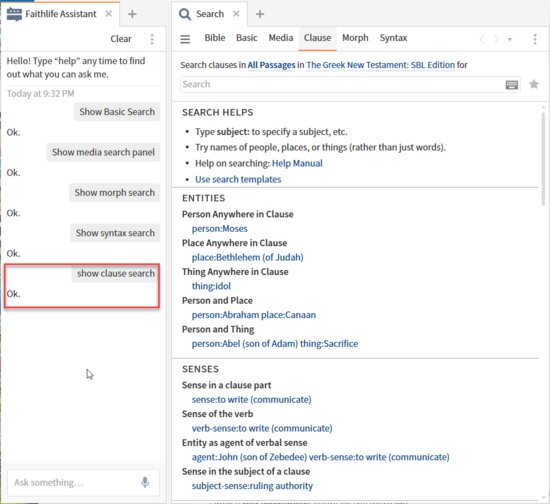Docx files for personal book: Verbum 9 part 1; Verbum 9 part 2; Verbum 9 part 3; Verbum 9 part 4; Verbum 9 part 5; How to use the Verbum Lectionary and Missal; Verbum 8 tips 1-30; Verbum 8 tips 31-49
Reading lists: Catholic Bible Interpretation
Please be generous with your additional details, corrections, suggestions, and other feedback. This is being built in a .docx file for a PBB which will be shared periodically.
Previous post: Verbum Tip 8b Next post: Verbum Tip 8d
Faithlife assistant: Search documents
There are two search types that generate search documents:
- Morph query
- Syntax search
Neither of these documents has been discussed yet but to illustrate Faithlife assistant, we will introduce them.
To Faithlife assistant: Create new morph query
Response:
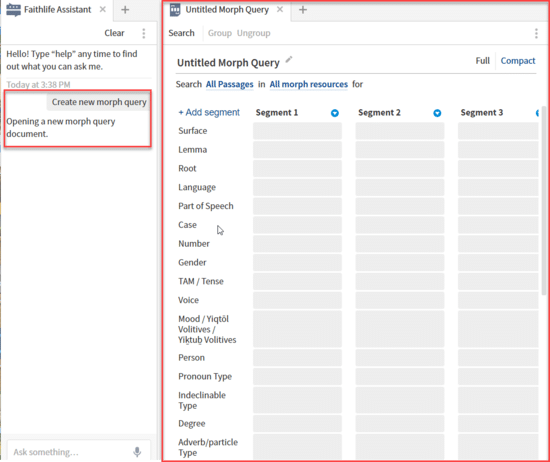
To Faithlife assistant: Create a new syntax search
Response
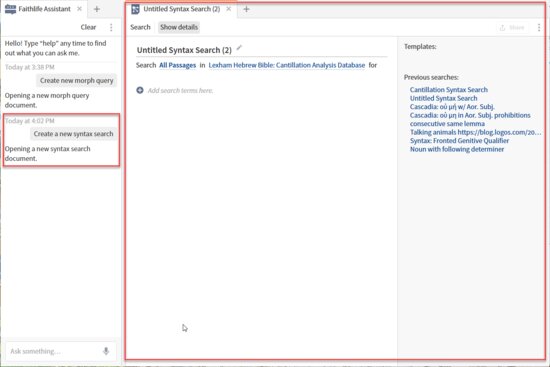
But no, I can’t open the Passage List created in the Bible Browser section. Faithlife is quite polite in its refusal, however.

Faithlife assistant: Search
The wiki list of Faithlife Assistant Commands includes twelve Search commands, some of which are simply synonyms. We will work through these examples in sequence.
To Faithlife assistant: Run a search for Shishak
Response: A simple request to run a search on a term will produce a Basic Everything search on that term. It does not take into consideration that Shishak is a personal name
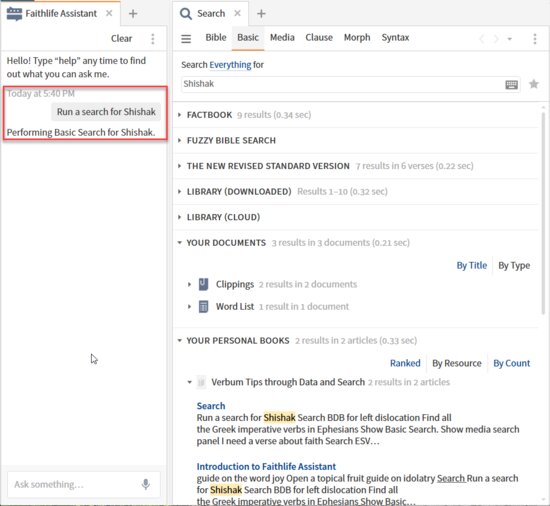
Note however, if the question indicates it is a person e.g. “Who is Shishak”, one gets a brief description and the Factbook entry.

To Faithlife assistant: Search BDB for left dislocation
Response: This requests a basic search on the BDB (i.e. Brown, Francis, Samuel Rolles Driver, and Charles Augustus Briggs. Enhanced Brown-Driver-Briggs Hebrew and English Lexicon. Oxford: Clarendon Press, 1977.) for two words – left & dislocation – in the same article. It finds no results.

If I exchange LDHB for the BDB, it is underlined in red indicating that it is not recognized as Runge, Steven E., and Joshua R. Westbury, eds. The Lexham Discourse Hebrew Bible. Bellingham, WA: Lexham Press, 2012–2014.
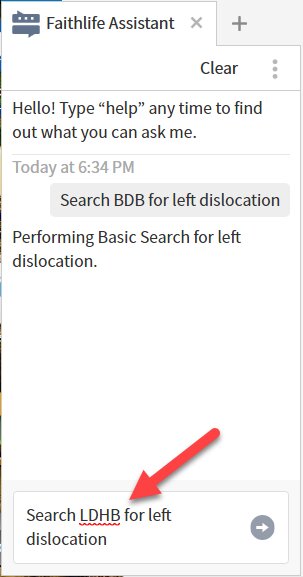
Only by reverting to “search for left dislocation” which initiates a Basic Everything search do I get results for the word pair.

Quotation marks may be used (when typing input) to create a search for the phrase “left dislocation” rather than simply the two terms in a single article.
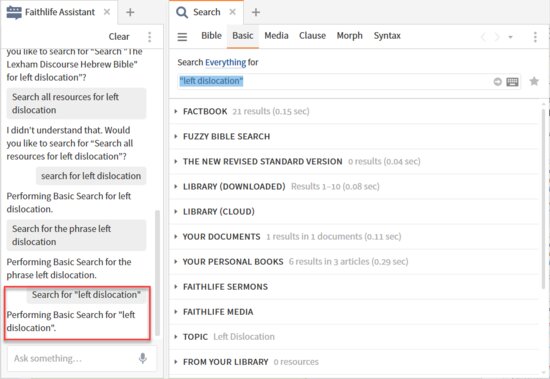
To Faithlife assistant: Find all the Greek imperative verbs in Ephesians
Response: This builds a morphology search for my 55 eligible Bibles (appropriate morphological coding or reverse interlinears) limiting the text to the Letter of Paul to the Ephesians. This is a search that drives me nuts – please vote for Add expand/contract function to results at resource level | Faithlife Feedback’ There is one little problem … the morphology is built only to identify verbs. The search for imperative verbs would be <LogosMorphGr ~ V??M????>
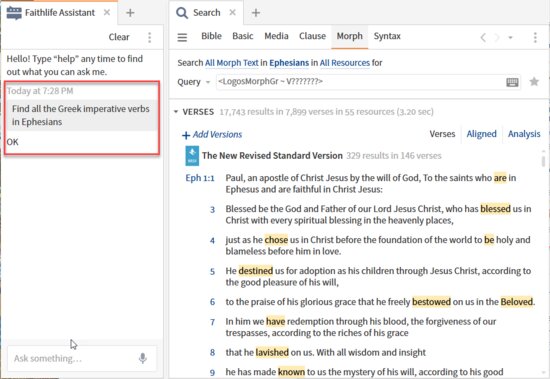
To Faithlife assistant: Show Basic Search.
Response: This opens a Basic Everything search into which the user enters a search argument.
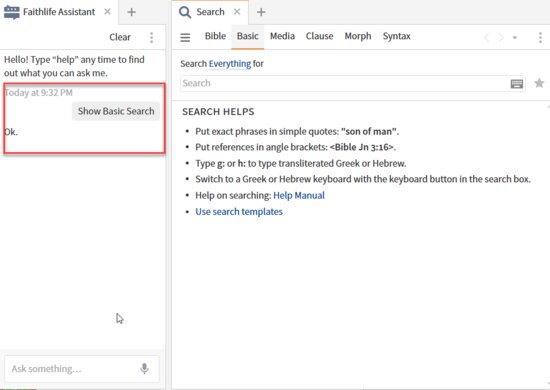
To Faithlife assistant: Show media search panel
Response: This opens an all media, all resources search into which the user enters a search argument.
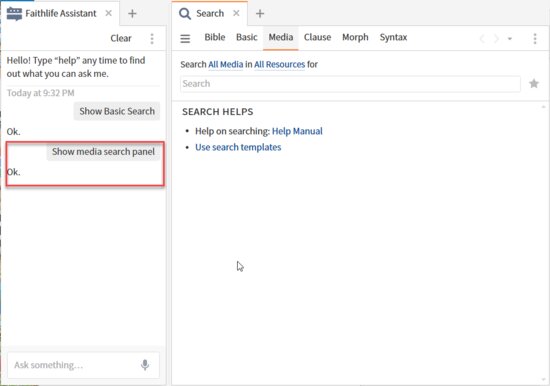
I’m going to go out on a limb here and suggest that show morph search and show syntax search work as well.
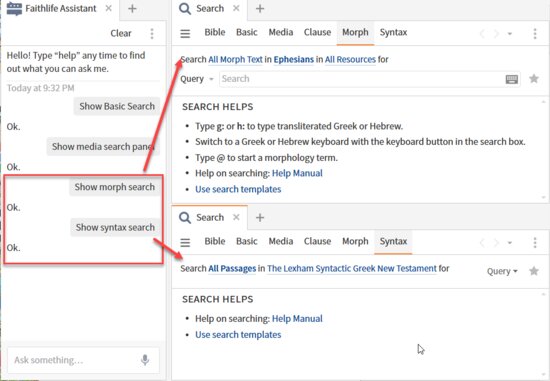
Note that the “show morph search” carries forward the text limitation of our early example i.e. from the last time it was used. It also assumes the entry of a search argument in the search box unlike the ”Create new morph query” demonstrated above. This results in quite different panel content. As the syntax search has only the document mode, there is no striking difference here.
Just for completeness, “show clause search” has the expected results. This search panel still has my preferred cookbook style help – click on the example and it will be added to the search argument for you to change the values as needed.
